- Home
- Stephen R. Donaldson
Thomas Covenant 01: Lord Foul's Bane Page 18
Thomas Covenant 01: Lord Foul's Bane Read online
Page 18
The ur-viles drew nearer. The tip of their wedge was a single figure, larger than the rest. Covenant could see it clearly. It looked like one of the Waynhim grown tall and evil—long torso, short limbs of equal length, pointed ears high on its head, eyeless face almost filled by gaping nostrils. Its slit mouth snapped like a trap whenever a Wraith came near. Mucus trailed from its nostrils back along either side of its head. When Covenant faced it, its nose twitched as if it smelled new game, and it snarled out a cadenced bark like an exhortation to the other creatures. The whole wedge thrust eagerly forward.
Atiaran caught up with Covenant and shouted in his ear, “Your hand! Look at your hand!”
He jerked up his left hand. A Wraith still clung to his ring—burning whitely—obliviously dancing.
The next instant, the leading ur-vile breached the core of the Dance and stopped. The attackers stood packed against each other’s shoulders behind their leader. Dark, roynish, and cruel, they slavered together and bit at the helpless Wraiths.
Covenant quailed as if his heart had turned to sand. But Atiaran raged, “Now! Strike them now!”
Trembling, he stepped forward. He had no idea what to do.
At once, the first ur-vile brandished a long knife with a seething, blood-red blade. Fell power radiated from the blade; in spite of themselves, Covenant and Atiaran recoiled.
The ur-vile raised its hand to strike.
Impulsively Covenant shoved the white, burning Wraith at the ur-vile’s face. With a snarl of pain, the creature jumped back.
A sudden intuition gripped Covenant. Instantly he touched the end of his staff to the burning Wraith. With a flash, bold white flame bloomed from the staff, shading the gold of the Dance and challenging the force of the ur-viles. Their leader retreated again.
But at once it regained its determination. Springing forward, it stabbed into the heart of the white fire with its blood-red blade.
Power clashed in the core of the Dance. The ur-vile’s blade seethed like hot hate, and the staff blazed wildly. Their conflict threw sparks as if the air were aflame in blood and lightning.
But the ur-vile was a master. Its might filled the bowl with a deep, crumbling sound, like the crushing of a boulder under huge pressure. In one abrupt exertion, Covenant’s fire was stamped out.
The force of the extinguishing threw him and Atiaran to their backs on the grass. With a growl of triumph, the ur-viles poised to leap for the kill.
Covenant saw the red knife coming, and cowered with a pall of death over his mind.
But Atiaran scrambled back to her feet, crying, “Melenkurion! Melenkurion abatha!” Her voice sounded frail against the victory of the ur-viles, but she met them squarely, grappled with the leader’s knife-hand. Momentarily she withheld its stroke.
Then, from behind her to the west, her cry was answered. An iron voice full of fury shouted, “Melenkurion abatha! Binas mill Banas Nimoram khabaal! Melenkurion abatha! Abatha Nimoram!” The sound broke through Covenant’s panic, and he lurched up to Atiaran’s aid. But together they could not hold back the ur-vile; it flung them to the ground again. At once, it pounced at them.
It was stopped halfway by a hulking form that leaped over them to tackle it. For a moment, the two wrestled savagely. Then the newcomer took the blood-red blade and drove it into the heart of the creature.
A burst of snarls broke from the ur-viles. Covenant heard a sweeping noise like the sound of many children running. Looking up, he saw a stream of small animals pour into the bowl—rabbits, badgers, weasels, moles, foxes, a few dogs. With silent determination, they hurled themselves at the ur-viles.
The Wraiths were scattering. While Covenant and Atiaran stumbled to their feet, the last flame passed from the bowl.
But the ur-viles remained, and their size made the animals’ attack look like a mere annoyance. In the sudden darkness, the creatures seemed to expand, as if the light had hindered them, forced them to keep their close ranks. Now they broke away from each other. Dozens of blades that boiled like lava leaped out as one, and in horrible unison began to slaughter the animals.
Before Covenant could take in all that was happening, the hulking figure who had saved them turned and hissed, “Go! North to the river. I have released the Wraiths. Now we will make time for your escape. Go!”
“No!” Atiaran panted. “You are the only man. The animals are not enough. We must help you fight.”
“Together we are not enough!” he cried. “Do you forget your task? You must reach the Lords—must! Drool must pay for this Desecration! Go! I cannot give you much time!” Shouting, “Melenkurion abatha!” he whirled and jumped into the thick of the fray, felling ur-viles with his mighty fists.
Pausing only to pick up the staff of Baradakas, Atiaran fled northward. And Covenant followed her, running as if the ur-vile blades were striking at his back. The stars gave them enough light. They drove themselves up the slope, not looking to see if they were pursued, not caring about the packs they left behind—afraid to think of anything except their need for distance. As they passed over the rim of the bowl, the sounds of slaughter were abruptly dimmed. They heard no pursuit. But they ran on—ran, and still ran, and did not stop until they were caught in midstride by a short scream, full of agony and failed strength.
At the sound, Atiaran fell to her knees and dropped her forehead to the earth, weeping openly. “He is dead!” she wailed. “The Unfettered One, dead! Alas for the Land! All my paths are ill, and destruction fills all my choices. From the first, I have brought wrong upon us. Now there will be no more Celebrations, and the blame is mine.” Raising her face to Covenant, she sobbed, “Take your staff and strike me, Unbeliever!”
Blankly Covenant stared into the pooled hurt of her eyes. He felt benumbed with pain and grief and wasted rage, and did not understand why she castigated herself. He stooped for the staff, then took her arm and lifted her to her feet. Stunned and empty, he led her onward into the night until she had cried out her anguish and could stand on her own again. He wanted to weep himself, but in his long struggle with the misery of being a leper he had forgotten how, and now he could only keep on walking. He was aware as Atiaran regained control of herself and pulled away from him that she accused him of something. Throughout the sleepless night of their northward trek, he could do nothing about it.
ELEVEN: The Unhomed
Gradually night stumbled as if stunned and wandering aimlessly into an overcast day—limped through the wilderland of transition as though there were no knowing where the waste of darkness ended and the ashes of light began. The low clouds seemed full of grief—tense and uneasy with accumulated woe—and yet affectless, unable to rain, as if the air clenched itself too hard for tears. And through the dawn, Atiaran and Covenant moved heavily, unevenly, like pieces of a broken lament.
The coming of one day made no difference to them, did not alter the way they fled—terrorless because their capacity for fear was exhausted—into the north. Day and night were nothing but disguises, motley raiment, for the constant shadow on the Land’s heart. To that heart they could not guess how much damage had been done. They could only judge by their own hurt—and so throughout the long, dismal night and day which followed the defilement of the Celebration, they walked on haunted by what they had witnessed and numb to everything else, as though even hunger and thirst and fatigue were extinguished in them.
That night, their flesh reached the end of its endurance, and they pitched blindly into sleep, no longer able to care what pursuit was on their trail. While they slept, the sky found some release for its tension. Blue lightning flailed the Hills; thunder groaned in long suppressed pain. When the travelers awoke, the sun stood over them, and their clothes were drenched with the night’s rain. But sunshine and morning could not unscar their wounded memories. They clambered like corpses to their feet—ate aliantha, drank from a stream—set off again walking as if they were stiff with death.
Yet time and aliantha and Andelainian air slowly worked the
ir resuscitations. Slowly Covenant’s weary thoughts shifted; the trudging horror of slaughter receded, allowed a more familiar pain to ache in him. He could hear Atiaran crying, Covenant, help them! and the sound made his blood ran cold with impotence.
The Wraiths, the Wraiths! he moaned dimly, distantly, to himself. They had been so beautiful—and he had been so unable to save them.
Yet Atiaran had believed him capable of saving them; she had expected some putting forth of power—Like Lena and Baradakas and everyone else he met, she saw him as Berek Halfhand reborn, the master of wild magic. You have might, the Despiser had said. You will never know what it is. He did not know; how could he? What did magic, or even dreams, have to do with him?
And yet the Wraiths had paid homage to his ring as if they recognized his lost humanity. They had been changed by it.
After a time, he said without meaning to speak aloud, “I would have saved them if I could.”
“You have the power.” Atiaran’s voice was dull, inert, as if she were no longer capable of grief or anger.
“What power?” he asked painfully.
“Do you wear the white gold for nothing?”
“It’s just a ring. I wear it—I wear it because I’m a leper. I don’t know anything about power.”
She did not look at him. “I cannot see. You are closed to me.”
At that, he wanted to protest, cry out, grab her by the shoulders and shout into her face, Closed? Look—look at me! I’m no Berek! No hero. I’m too sick for that. But he lacked the strength. And he had been too badly hurt—hurt as much by Atiaran’s impossible demand as by his powerlessness.
How—?
The Wraiths!
How can this happen to me?
A moment passed while he groaned over the question. Then he sighed to himself, I should have known—He should have heard his danger in Atiaran’s singing of the Berek legend, seen it in Andelain, felt it in the revulsion in his boots. But he had been deaf, blind, numb. He had been so busy moving ahead, putting madness behind him, that he had ignored the madness toward which the path of his dream tended. This dream wanted him to be a hero, a savior; therefore it seduced him, swept him along—urging him forward so that he would run heedless of himself to risk his life for the sake of Wraiths, the Land, illusion. The only difference in this between Atiaran and Lord Foul was that the Despiser wanted him to fail.
You will never know what it is. Of course he would never know. A visceral anger writhed under his fatigue. He was dreaming—that was the answer to everything, to the Land’s impossible expectations of him as well as to the Land’s impossibility. He knew the difference between reality and dream; he was sane.
He was a leper.
And yet the Wraiths had been so beautiful. They had been slaughtered—
I’m a leper!
Trembling, he began to give himself a VSE. Hellfire! What do Wraiths and wild magic and Berek bloody Halfhand have to do with me? His body appeared whole—he could see no injuries, his clothing was rumpled but unrent—but the end of the Hirebrand’s staff had been blackened by the power of the ur-viles. By hell! They can’t do this to me.
Fuming against his weariness, he shambled along at Atiaran’s side. She did not look at him, did not seem to recognize his presence at all; and during that day he left her alone as if he feared how he would respond if he gave her an opportunity to accuse him. But when they halted that evening, the cold night and the brittle stars made him regret the loss of their blankets and graveling. To distract himself from his hollow discomfort, he resumed his half-forgotten efforts to learn about the Land. Stiffly he said, “Tell me about that—whoever saved us. Back there.”
A long silence passed before she said, “Tomorrow.” Her voice was lightless, unillumined by anything expect torpor or defeat. “Let me be. Until tomorrow.”
Covenant nodded in the darkness. It felt thick with cold and beating wings, but he could answer it better than he could reply to Atiaran’s tone. For a long time he shivered as if he were prepared to resent every dream that afflicted a miserable mankind, and at last he fell into fitful slumber.
The next day, the ninth from Soaring Woodhelven, Atiaran told Covenant about the Unfettered One in a voice as flat as crushed rock, as if she had reached the point where what she said, how she exposed herself, no longer mattered to her. “There are those from the Loresraat,” she said, “who find that they cannot work for the Land or the Lore of the Old Lords in the company of their fellows—Lords or Lorewardens, the followers of Sword or Staff. Those have some private vision which compels them to seek it in isolation. But their need for aloneness does not divide them from the people. They are given the Rites of Unfettering, and freed from all common demands, to quest after their own lore with the blessing of the Lords and the respect of all who love the Land. For the Lords learned long ago that the desire for aloneness need not be a selfish desire, if it is not made so by those who do not feel it.
“Many of the Unfettered have never returned into knowledge. But stories have grown up around those Ones who have not vanished utterly. Some are said to know the secrets of dreams, others to practice deep mysteries in the arts of healing, still others to be the friends of the animals, speaking their language and calling on their help in times of great need.
“Such a One saved us”—her voice thickened momentarily—“a learner of the Wraiths and a friend to the small beasts of the woods. He knew more of the Seven Words than my ears have ever heard.” She groaned softly. “A mighty man, to have been so slain. He released the Wraiths, and saved our lives. Would that I were worth so much. By the Seven! No evil has ever before been aimed at the Wraiths of Andelain. The Gray Slayer himself never dared—And it is said that the Ritual of Desecration itself had no power to touch them. Now it is in my heart that they will not dance again.”
After a heavy pause, she went on: “No matter. All things end, in perversion and death. Sorrow belongs to those who also hope. But that Unfettered One gave his life so that you and your message and your ring might reach the Lords. This we will accomplish, so that such sacrifices may have meaning.”
She fell silent again for a moment, and Covenant asked himself, Is that why? Is that what living is for? To vindicate the deaths of others? But he said nothing, and shortly Atiaran’s thoughts limped back to her subject. “But the Unfettered. Some are dreamers, some healers, some share the life of the animals. Some delve the earth to uncover the secrets of the Cavewights, others learn the lore of the Demondim—whatever knowledge guides the One’s private prophecy. I have even heard it whispered that some Unfettered follow the legend of Caerroil Wildwood of Garroting Deep, and become Forestals. But that is a perilous thought, even when whispered.
“Never before have I seen one of the Unfettered. But I have heard the Rites of Unfettering. A hymn is sung.” Dully she recited:
Free
Unfettered
Shriven
Free—
Dream that what is dreamed will be:
Hold eyes clasped shut until they see,
And sing the silent prophecy—
And be
Unfettered
Shriven
Free.
There is more, but my weakness will not recall—It may be that I will not sing any song again.” She pulled her robe tight around her shoulders as if a wind were chilling through her, and said nothing more for the rest of the day.
That night, when they had camped, Covenant again could not sleep. Unwillingly he lay awake and watched for the sliver of the new moon. When it finally rose over the Hills, he was appalled to see that it was no longer silver-white, but red—the color of blood and Drool’s laval eyes.
It hued the Hills with wrongness, gave the night a tinge of crimson like blood sweat sheening the shrubs and trees and grass and slopes, as if the whole of Andelain were in torment. Under it, the violated ground shimmered as if it were shuddering.
Covenant stared at it, could not close his eyes. Though he badly wanted c
ompany, he clamped his teeth together, refused to awaken Atiaran. Alone and shivering, with the staff of Baradakas clutched in his sweating hands, he sat up until moonset, then slept on the edge of consternation until dawn.
And on the fourth day after the night of the Dance, it was he who set the pace of their traveling. He pushed their speed more and more as the day passed, as though he feared that the bloody moon were gaining on them.
When they halted for the night, he gave Atiaran his staff and made her sit awake to see the moon. It came over the horizon in a crimson haze, rising like a sickle of blood in the heavens. Its crescent was noticeably fuller than it had been the previous night. She stared at it rigidly, clenched the staff, but did not cry out. When she had tasted all its wrong, she said tonelessly, “There is no time,” and turned her face away.
But when morning came, she once more took charge of their pace. Under the pall of the despoiled moon she seemed to have reached a resolution, and now she drove herself forward as if she were spurred by some self-curse or flagellation which rejected through naked determination the logic of defeat. She seemed to believe that she had lost everything for herself and for the Land, yet the way she walked showed that pain could be as sharp a goad as any. Again Covenant found himself hurrying as hard as he could to keep up with her fierce back.
He accepted her pace in the name of his complex dread; he did not want to be caught by the forces that could attack Wraiths and render moons incarnadine. But he was scrupulous about his VSE and other self protections. If he could have found a blade other than his penknife, he would have shaved with it.
They spent that day, part of the night, and the morning of the next day stumbling forward on the verge of a run. Covenant sustained their rate as best he could, but long days and restless nights had drained his stamina, made his stride ragged and his muscles irresilient. He came to lean more and more on his staff, unable to keep his balance without it. And even with it he might have fallen if he had been pursuing such a pace in some other region. But the keen essence of Andelain supported him. Healthy air salved his lungs, thick grass cushioned his sore joints, Gilden shaded him, treasure-berries burst with energy in his mouth. And at last, near noon on the sixth day, he and Atiaran staggered over the crest of a hill and saw at the bottom of the slope beyond them the Soulsease River.

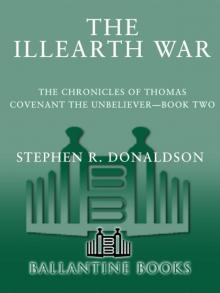 The Illearth War
The Illearth War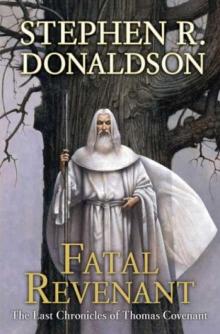 Last Chronicles of Thomas Covenant 02 - Fatal Revenant
Last Chronicles of Thomas Covenant 02 - Fatal Revenant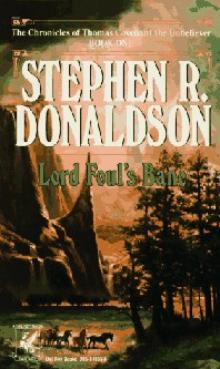 Lord Foul's Bane
Lord Foul's Bane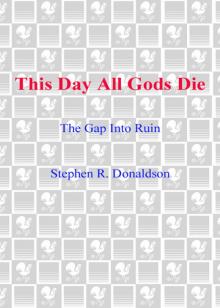 The Gap Into Ruin: This Day All Gods Die
The Gap Into Ruin: This Day All Gods Die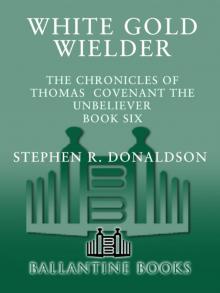 White Gold Wielder
White Gold Wielder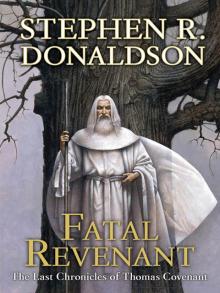 Fatal Revenant
Fatal Revenant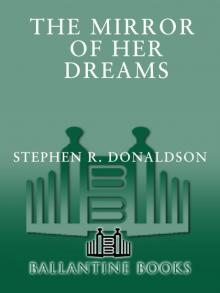 The Mirror of Her Dreams
The Mirror of Her Dreams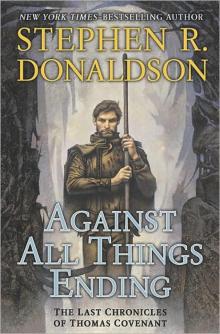 Against All Things Ending
Against All Things Ending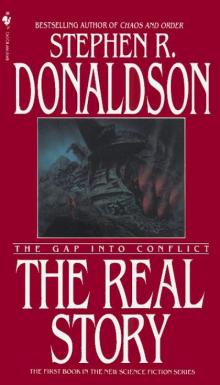 The Real Story: The Gap Into Conflict
The Real Story: The Gap Into Conflict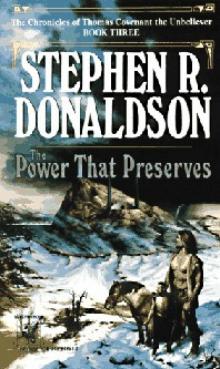 The Power That Preserves
The Power That Preserves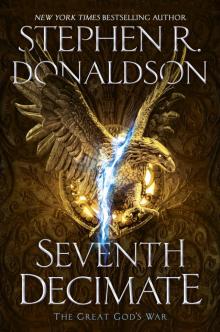 Seventh Decimate
Seventh Decimate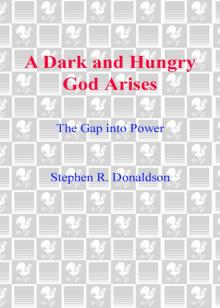 The Gap Into Power: A Dark and Hungry God Arises
The Gap Into Power: A Dark and Hungry God Arises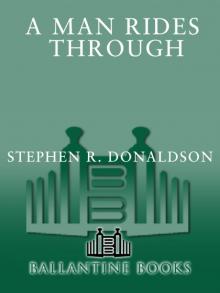 A Man Rides Through
A Man Rides Through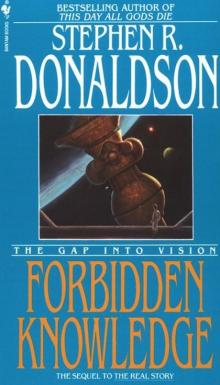 The Gap Into Vision: Forbidden Knowledge
The Gap Into Vision: Forbidden Knowledge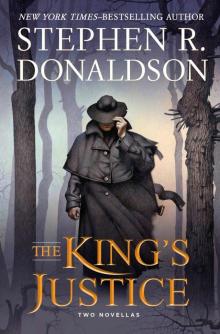 The King's Justice: Two Novellas
The King's Justice: Two Novellas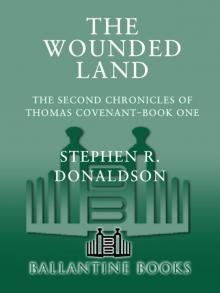 The Wounded Land
The Wounded Land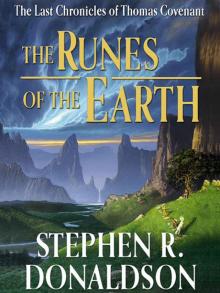 The Runes of the Earth
The Runes of the Earth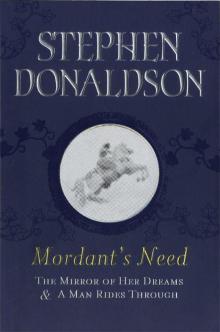 Mordant's Need
Mordant's Need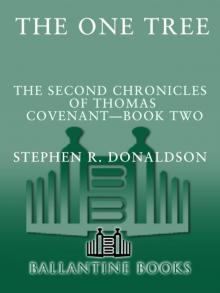 The One Tree
The One Tree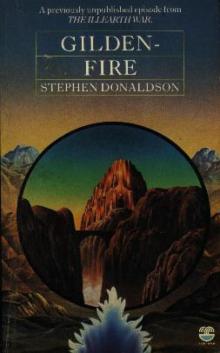 Gilden-Fire
Gilden-Fire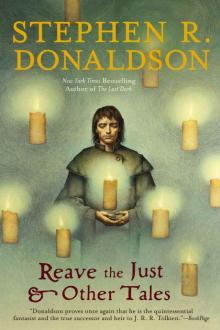 Reave the Just and Other Tales
Reave the Just and Other Tales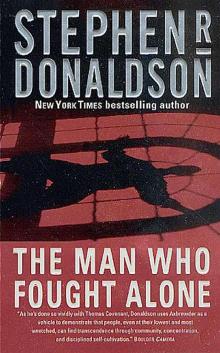 The Man Who Fought Alone
The Man Who Fought Alone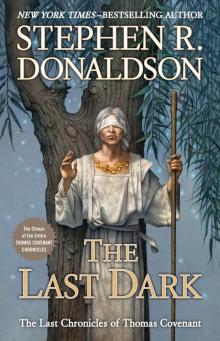 The Last Dark
The Last Dark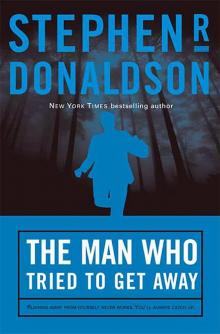 The Man Who Tried to Get Away
The Man Who Tried to Get Away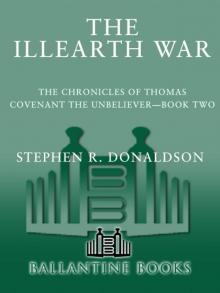 Thomas Covenant 02: The Illearth War
Thomas Covenant 02: The Illearth War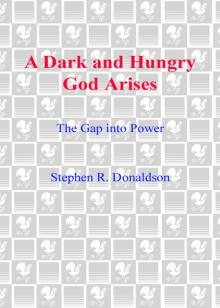 A Dark and Hungry God Arises
A Dark and Hungry God Arises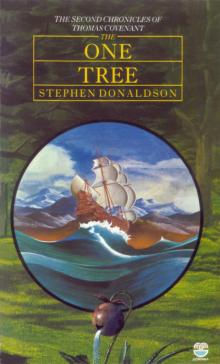 The One Tree t2cotc-2
The One Tree t2cotc-2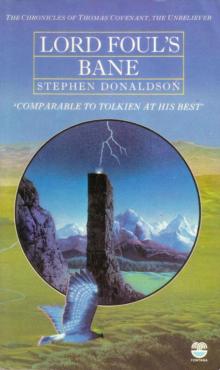 Lord Foul's Bane cotc-1
Lord Foul's Bane cotc-1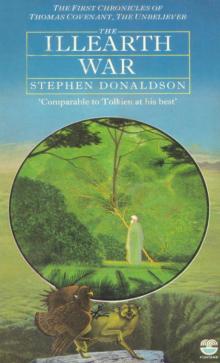 The Illearth War t1cotc-2
The Illearth War t1cotc-2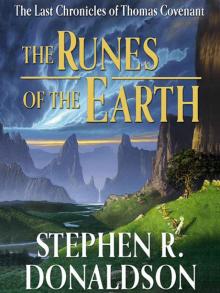 The Runes of the Earth: The Last Chronicles of Thomas Covenant - Book One
The Runes of the Earth: The Last Chronicles of Thomas Covenant - Book One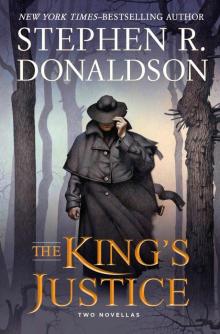 The King's Justice
The King's Justice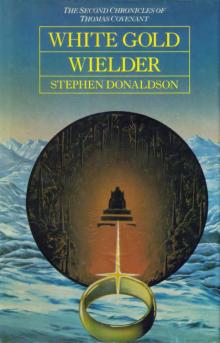 White Gold Wielder t2cotc-3
White Gold Wielder t2cotc-3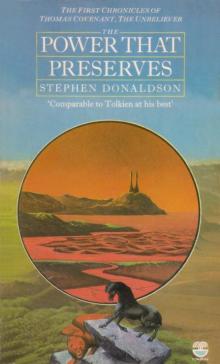 The Power That Preserves t1cotc-3
The Power That Preserves t1cotc-3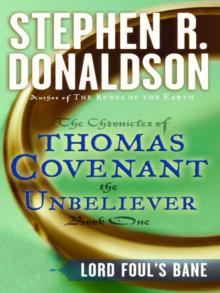 Thomas Covenant 01: Lord Foul's Bane
Thomas Covenant 01: Lord Foul's Bane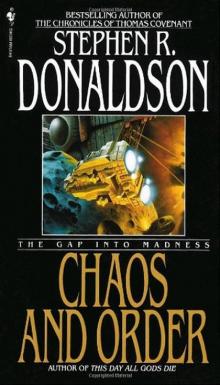 Chaos and Order: The Gap Into Madness
Chaos and Order: The Gap Into Madness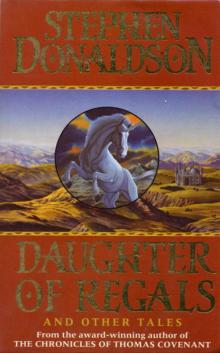 Daughter of Regals
Daughter of Regals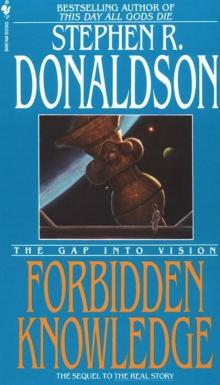 Forbidden Knowledge: The Gap Into Vision
Forbidden Knowledge: The Gap Into Vision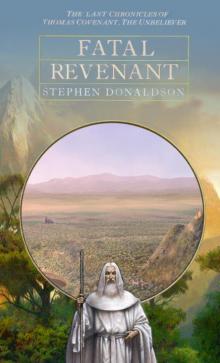 Fatal Revenant t3cotc-2
Fatal Revenant t3cotc-2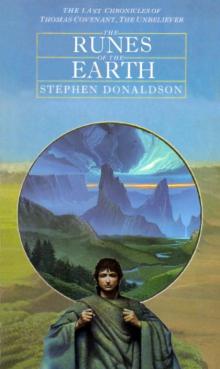 The Runes of the Earth t3cotc-1
The Runes of the Earth t3cotc-1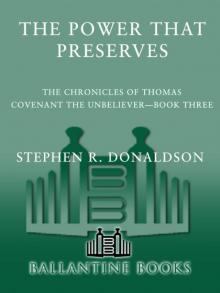 Thomas Covenant 03: Power That Preserves
Thomas Covenant 03: Power That Preserves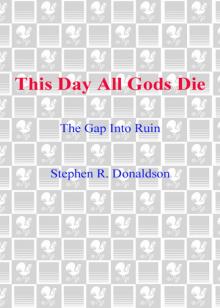 This Day all Gods Die: The Gap into Ruin
This Day all Gods Die: The Gap into Ruin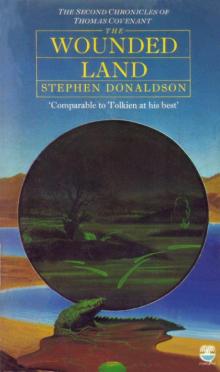 The Wounded Land t2cotc-1
The Wounded Land t2cotc-1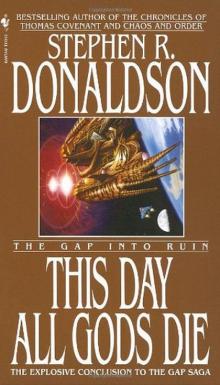 This Day All Gods Die
This Day All Gods Die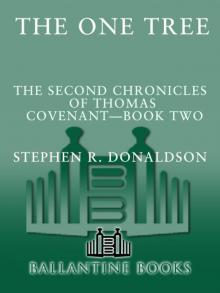 One Tree
One Tree